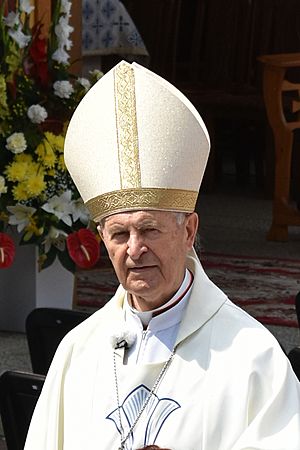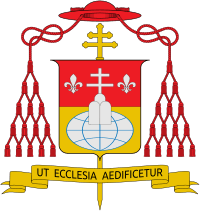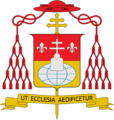Jozef Tomko facts for kids
Quick facts for kids His Eminence Jozef Tomko |
|
|---|---|
| President Emeritus of the Pontifical Committee for International Eucharistic Congresses | |

Tomko in 2018 at Zvir Mountain in Litmanová, Slovakia
|
|
| Appointed | 23 October 2001 |
| Reign ended | 1 October 2007 |
| Predecessor | Edouard Gagnon |
| Successor | Piero Marini |
| Other posts | Cardinal-Priest of Santa Sabina |
| Orders | |
| Ordination | 12 March 1949 |
| Consecration | 15 September 1979 by Pope John Paul II |
| Created Cardinal | 25 May 1985 |
| Rank | Cardinal priest |
| Personal details | |
| Born | 11 March 1924 Udavské, Czechoslovakia (present-day Slovakia) |
| Died | 8 August 2022 (aged 98) Rome, Italy |
| Nationality | Slovak |
| Denomination | Roman Catholic |
| Previous post |
|
| Motto | "Ut ecclesia aedificetur" |
| Coat of arms |  |
| Styles of Jozef Tomko |
|
|---|---|
 |
|
| Reference style | His Eminence |
| Spoken style | Your Eminence |
| Informal style | Cardinal |
Jozef Tomko (born March 11, 1924 – died August 8, 2022) was an important leader in the Catholic Church. He was from Slovakia. He worked in the Roman Curia (the Vatican's main offices) from 1962 until he retired in 2007. He was in charge of the Congregation for the Evangelization of Peoples from 1985 to 2001. He also led the Pontifical Committee for International Eucharistic Congresses from 2001 to 2007. He became a Cardinal in 1985.
Contents
Biography
Early Life and Becoming a Priest
Jozef Tomko was born on March 11, 1924. His hometown was Udavské, which is in Slovakia today. In 1943, he started studying theology in Bratislava. He then moved to Rome, Italy, to continue his studies. He earned special degrees in theology, church law, and social sciences. On March 12, 1949, he became a priest. This important event happened in Rome.
Church Work and Teaching
After becoming a priest, Jozef Tomko continued his studies. He also worked as a priest in Rome. From 1950 to 1965, he helped lead the Pontifical Nepomucenum College. He also taught at a university called Pro Deo for a year. Tomko helped create the Slovak Institute of Saints Cyril and Methodius in Rome. He often visited Slovak communities in other countries, like the United States and Canada. He also spoke regularly to Slovak Catholics on Vatican Radio and Catholic TV Lux.
Working in the Vatican
In 1962, Tomko started working for the Roman Curia. This is like the main government of the Catholic Church. He first worked in a section that reviewed books. During the Second Vatican Council (1962–1965), he was an advisor. He later became a member of a special group for families. In 1974, he became an Undersecretary for the Congregation for Bishops. He also taught as a visiting professor at the Gregorian University from 1970 to 1977.
Becoming a Bishop
On July 12, 1979, Pope John Paul II made Tomko the Secretary General of the World Synod of Bishops. This is a meeting of bishops from all over the world. He also became an Archbishop. On September 15, 1979, Pope John Paul II officially made him a bishop. In October 1979, he joined a group that helped explain the rules from the Second Vatican Council. In 1985, he was named Pro-Prefect of the Congregation for the Evangelization of Peoples. He also became the Chancellor of the Pontifical Urbaniana University.
Becoming a Cardinal
On May 25, 1985, Pope John Paul II made Jozef Tomko a Cardinal. This is a very high rank in the Catholic Church. He then became the head of the Congregation for the Evangelization of Peoples. During this time, he became a close friend and advisor to Pope John Paul II. He was also sent by the Pope to represent him at many religious events. In 1996, he chose a new church in Rome to be his special "titular church" as a Cardinal.
Leading Eucharistic Congresses
On October 23, 2001, Cardinal Tomko was chosen to lead the Pontifical Committee for International Eucharistic Congresses. These are large international meetings focused on the Eucharist, a central part of Catholic worship. In this role, he led the Vatican's group to an interreligious meeting in Astana, Kazakhstan, in 2003. He also led the 48th International Eucharistic Congress in Guadalajara, Mexico, in 2004.
When Pope John Paul II passed away in 2005, Cardinal Tomko, like other Vatican leaders, temporarily lost his position. However, Pope Benedict XVI confirmed him as the head of the International Eucharistic Congresses on April 21, 2005. Cardinal Tomko retired from this role on October 1, 2007.
Later Work
In 2012, Pope Benedict XVI asked Cardinal Tomko to be part of a special group. This group investigated leaks of secret documents from the Vatican. Cardinal Tomko was one of three cardinals on this important commission.
When Pope Francis became Pope on March 19, 2013, Cardinal Tomko was one of six cardinals who publicly showed their obedience to the new Pope. In February 2015, he attended a meeting of cardinals to discuss changes to the Roman Curia.
Cardinal Tomko became the oldest living member of the College of Cardinals on July 29, 2021. He passed away in Rome on August 8, 2022, at the age of 98.
Selected Works
- Light of Nations (Rome 1972)
- On Missionary Roads, 2007, ISBN: 978-1586171650
Honours and Awards
Cardinal Tomko received many awards and honors for his work:
- Grand-Croix de l'Ordre de la Couronne de Chene (Luxembourg 1988)
- Grand Cross of the Order of the White Double Cross (1995)
- Grand Cruz de la Orden del Libertador San Martín, Argentina (Buenos Aires 1999)
- The Catholic University of Ruzomberok gave him an honorary degree in 2006.
- He received an honorary doctorate from Pavol Jozef Safarik University in Kosice in 2001. This was for his help in developing culture, education, and humanity in Slovakia.
- The Golden Plaque of the Ministry of Foreign and European Affairs of the Slovak Republic (2009)
Images for kids
See also
 In Spanish: Jozef Tomko para niños
In Spanish: Jozef Tomko para niños
 | James Van Der Zee |
 | Alma Thomas |
 | Ellis Wilson |
 | Margaret Taylor-Burroughs |



